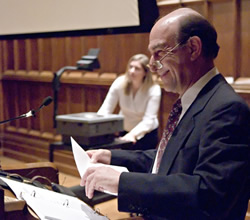Grading Equity
Richard Rothstein agrees with No Child Left Behind supporters on at least one point: Holding schools accountable for improving children's reading and writing skills will, in fact, eventually lead to improvement in those skills. The problem, as Rothstein outlined it on Monday evening, January 30th during the first of a three-part Teachers College lecture series known as the Tisch Lectures, is that only those skills will improve-'"to the detriment of others that are equally important.
Richard Rothstein agrees with No Child Left Behind supporters on at least one point: Holding schools accountable for improving children's reading and writing skills will, in fact, eventually lead to improvement in those skills. The problem, as Rothstein outlined it on Monday evening, January 30th during the first of a three-part Teachers College lecture series known as the Tisch Lectures, is that only those skills will improve-'"to the detriment of others that are equally important.
"What gets measured, gets done," said Rothstein, Tisch Visiting Professor at TC and research associate at the Economic Policy Institute, in a talk he titled Equity in What? Defining the Goals of American Education for which We Seek Equity. "The current accountability system makes American education more inequitable in other areas, because the places that are weakest in basic skills are most likely to reduce effort in other subjects to increase drill in math and reading."
For the past year and a half, Rothstein and two graduate assistants, Rebecca Jacobsen and Tamara Wilder, have been working to create a new "report card" that will assess the nation's progress in providing equal educational opportunities across a much broader range of skills. The list, unveiled at the first Tisch lecture, includes basic academic skills; critical thinking; social skills and work ethic; citizenship; physical health; emotional health; the arts and literature; and vocational education. The categories were neither arbitrarily chosen, nor unprecedented in their breadth; in fact, as Rothstein demonstrated, they closely resemble educational goals put forth at various moments in American history by a list of authors that includes George Washington, John Adams (in the Massachusetts state constitution), Thomas Jefferson, Robert Dale Owen, Horace Mann, the National Education Association, the American Federation of Teachers, Milton Friedman, the Rockefeller Foundation, the Supreme Courts of West Virginia and New Jersey, and--as recently as 1991--the U.S. Department of Education.
"Holding schools accountable only for math and reading is an extreme position," Rothstein said. "NCLB is an historical anomaly."
To bring that point home, Rothstein then presented results from a survey in which representative samples of state legislators, school board members and the national adult population were asked to rank, in order of importance, the eight educational goals that will form the basis of the TC report card. He compared these to the ranking the Teachers College Report Card would set, as well as to a poll taken from the lecture's audience members earlier in the evening. Overall, the rankings were strikingly similar and, in all three instances, respondents ranked categories such as critical thinking, social skills and citizenship as very important.
Beyond NCLB's impact on students, Rothstein also argued that the legislation has been a negative for teachers. He shared with the audience a letter he had recently received from a TC alumna, Jacquelyn Duran, who had taught at a low-performing school in Los Angeles.
"The pressure became so intense that we had to show how every single lesson we taught connected to a standard that was going to be tested," Duran had written. "This meant that art, music and even science and social studies were hardly ever taught...This was a huge part of why I left the profession."
In the next lecture in the series, in March 6, Rothstein will present a range of more specific indicators within each of the report card's eight categories.
The report card's ultimate goal, Rothstein said, is to spark debate about educational priorities and prod political and educational leaders to hold schools accountable for a broader range of skill development.
"Accountability is a favorite mantra of the right wing," he said, "and I agree with it."
Published Thursday, Feb. 23, 2006
